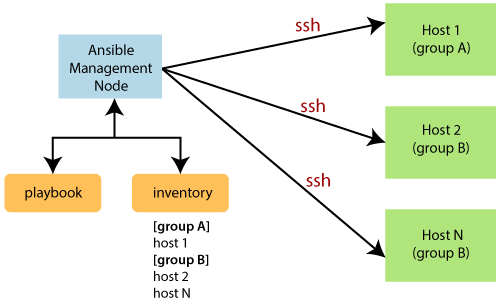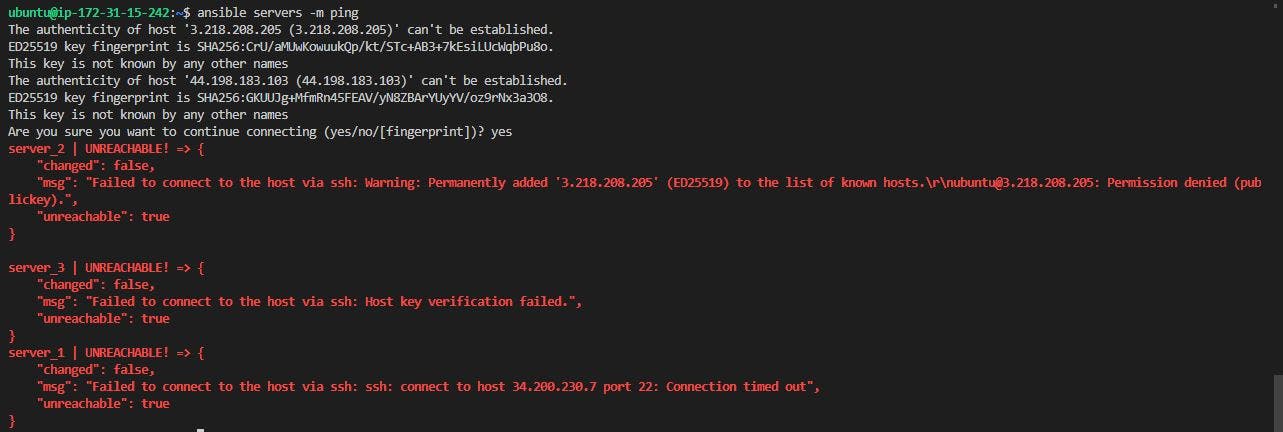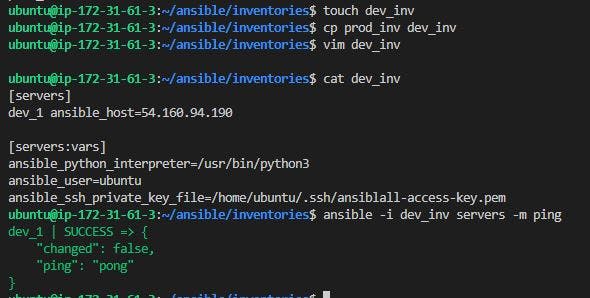Ansible Workflow:

In the above image, the Management Node is the controlling node that controls the entire execution of the playbook. The inventory file provides the list of hosts where the Ansible modules need to be run. The Management Node makes an SSH connection and executes the small modules on the host's machine and install the software.
Terms used in Ansible:
| Terms | Explanation |
| Ansible Server | It is a machine where Ansible is installed and from which all tasks and playbooks will be executed. |
| Modules | The module is a command or set of similar commands which is executed on the client-side. |
| Task | A task is a section which consists of a single procedure to be completed. |
| Role | It is a way of organizing tasks and related files to be later called in a playbook. |
| Fact | The information fetched from the client system from the global variables with the gather facts operation. |
| Inventory | A file containing the data regarding the Ansible client-server. |
| Play | It is the execution of the playbook. |
| Handler | The task is called only if a notifier is present. |
| Notifier | The section attributed to a task which calls a handler if the output is changed. |
| Tag | It is a name set to a task that can be used later on to issue just that specific task or group of jobs. |
Create Ansible Master Node:
Select ubuntu machine.

Security parameter: SSH+HTTP+HTTPS & launch your instance.

Installation of Ansible on Ubuntu:
google "digitalocean" for installing ansible on ubuntu.

sudo apt-add-repository ppa:ansible/ansible

sudo apt update

sudo apt install ansible

Creation of Ansible worker node:
Create 3 ansible worker nodes where automation will be applied through Ansible Master: Ubuntu machine & having the same key as master node.

Inventory file creation:
Mention the servers here where automation needs to be reflected:
sudo nano /etc/ansible/hosts


Ping all the worker nodes from master:
ansible servers -m ping

Copy .pem key from Local PC to Ansible Master:
PS C:\Users\Haha CORPORATION\Downloads> scp -i "ansible-all-access-key.pem" ansible-all-access-key.pem ubuntu@ec2-44-198-183-103.compute-1.amazonaws.com:/home/ubuntu/.ssh

Check this copied key @ Ansible Master

If we want to apply same variable on all the ansible worker node: we need to define "vars"
[server:vars]
ansible_python_interpreter=/usr/bin/python3
ansible_ssh_private_key_file=/home/ubuntu/.ssh/ansible-all-access-key.pem

Permission granted to this key:
chmod 600 ansible-all-access-key.pem
Now ping all the Ansible worker node from Ansible Master
ansible servers -m ping

All the nodes are pinging from the master node.
Automation process:
Check the disk details of all the ansible worker node:
ansible servers -a "df -h"
-a : used for writing a command
-m: is used for predefined module.

Check the uptime of ansible worker nodes:
ansible servers -a "uptime"

Inventory file creation:
Create Inventory "prod-inv":
[servers]
prod_1 ansible_host=54.157.162.2
[servers:vars]
ansible_python_interpreter=/usr/bin/python3
ansible_user=ubuntu
ansible_ssh_private_key_file=/home/ubuntu/.ssh/ansiblall-access-key.pem

Ping this inventory:
ansible -i prod_inv servers -m ping

Create Inventory "dev-inv" & ping :
[servers]
dev_1 ansible_host=54.160.94.190
[servers:vars]
ansible_python_interpreter=/usr/bin/python3
ansible_user=ubuntu
ansible_ssh_private_key_file=/home/ubuntu/.ssh/ansiblall-access-key.pem

Playbook Creation:
Create install_nginx.yml paybook file
-
name: this playbook install nginx
hosts: servers
become: yes
tasks:
- name: install nginx
apt:
name: nginx
state: latest
- name: start nginx
service:
name: nginx
state: started
enabled: yes

Run the playbook:
ansible-playbook install_nginx.yml

Verify whether ansible is installed on the worker node:
ssh any ansible worker node.
When condition in playbook
create install_condition.yml
-
name: this will install based on os
hosts: servers
become: yes
tasks:
- name: install Docker
apt:
name: docker
state: latest
when: ansible_distribution == "CentOS" or ansible_distribution == "Red Hat Enterprise Linux"

Run "install_condition.yml"
ansible-playbook install_condition.yml

#Installation of aws CLI impacted on all the Ubuntu servers.
Check docker installed or not on asible worker1:
ssh & run command docker --version

Thank you for reading!Happy Learning!!
Santosh Chauhan
